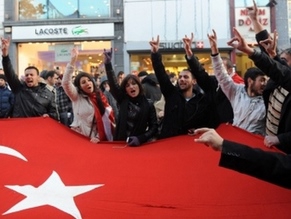|
World Jewish News

A protest outside the French consulate in Istanbul, Turkey, December 25, 2011. Photo by: AFP
|
Foreign Ministry: Israel's recognition of Armenian genocide could threaten Turkey ties
26.12.2011, Israel and the World The Foreign Ministry warned that Israel's possible recognition of the Armenian genocide, which was discussed in a Knesset committee on Monday, could lead to the serious deterioration of Israel's ties with Turkey.
A Knesset committee discussed on Monday the possibility of setting a memorial day for the Armenian genocide by the Turkish people nearly 100 years ago, marking a first in Israeli history.
Several MKs expressed support for the move, saying that Israel, as a nation of the Jewish people who have experienced genocide, cannot ignore genocides in other countries.
However, the recognition of the Armenian genocide has long been a sensitive diplomatic issue due to the implications it has on Israel's relationship with Turkey, which denies it.
"This subject, given the current atmosphere, could deteriorate our ties with Turkey," A Foreign Ministry representative said during the discussion. "Our relationship with Turkey is very fragile and sensitive right now, and we cannot cross the line – we must approach the subject intelligently. Such a decision could have very serious strategic consequences. "
Knesset Speaker Reuven Rivlin (Likud) said that the discussion did not arise because of the weakening ties between Israel and Turkey, maintaining that as a nation and a country, Israel cannot allow the denial of a disaster.
"We stand before all the world's countries with the highest and most ethical demand, saying that Holocaust denial is something human kind cannot agree with," Rivlin said, stressing that Israel must recognize other countries' genocides.
"For many years, Israel's government has refused to recognize the genocide for cynical, strategic and economic, reasons, connected to its ties with Turkey," said MK Zahava Gal-On (Meretz), who has sponsored the call for recognizing the Armenian genocide.
"Now, given the state of relations between the countries, I can't rule out the possibility that the Foreign Ministry is exploiting affairs and trying to goad Turkey."
Gal-On added that "our moral obligation transcends such cynical calculations, and I hope that the Knesset committee will reach a decision in favor of recognizing the genocide, in the Knesset's first public hearing on the matter. The education committee is the right place for examining the topic, which is omitted from school curricula."
National Union MK Ariyeh Eldad, one of the initiators of the discussion, said that "in the past, we were always told that we cannot discuss this subject because of our good relationship with Turkey. Now we are told we cannot discuss this because of our bad relationship with Turkey. We cannot erase a chapter in history. We cannot ignore this subject because of our interests."
Kadima MK Otniel Schneller was the only one who expressed outright opposition to an official recognition by Israel of the Armenian genocide.
"We cannot disconnect the discussion from the fact that we must rehabilitate our ties with Turkey – it's an existential necessity," he said. "We need to fit in the Middle East even if it is difficult."
Up to now, proposals for recognizing the Armenian genocide have been considered by closed sessions of the Knesset's Foreign Affairs and Defense Committee. That committee rejected the proposals a number of times.
Recognition of the Armenian genocide is a sensitive diplomatic issue. Last week, the lower house of France's parliament approved a bill that bans denial of the genocide, which occurred 96 years ago. The law imposes a one-year jail sentence and a 45,000-euro fine.
This step triggered a diplomatic crisis between France and Turkey. Ankara recalled its ambassador, canceled diplomatic, economic and military exchanges with France, and banned the landing of French military planes at its airports and the docking of French ships at its harbors.
Haaretz.com
|
|
